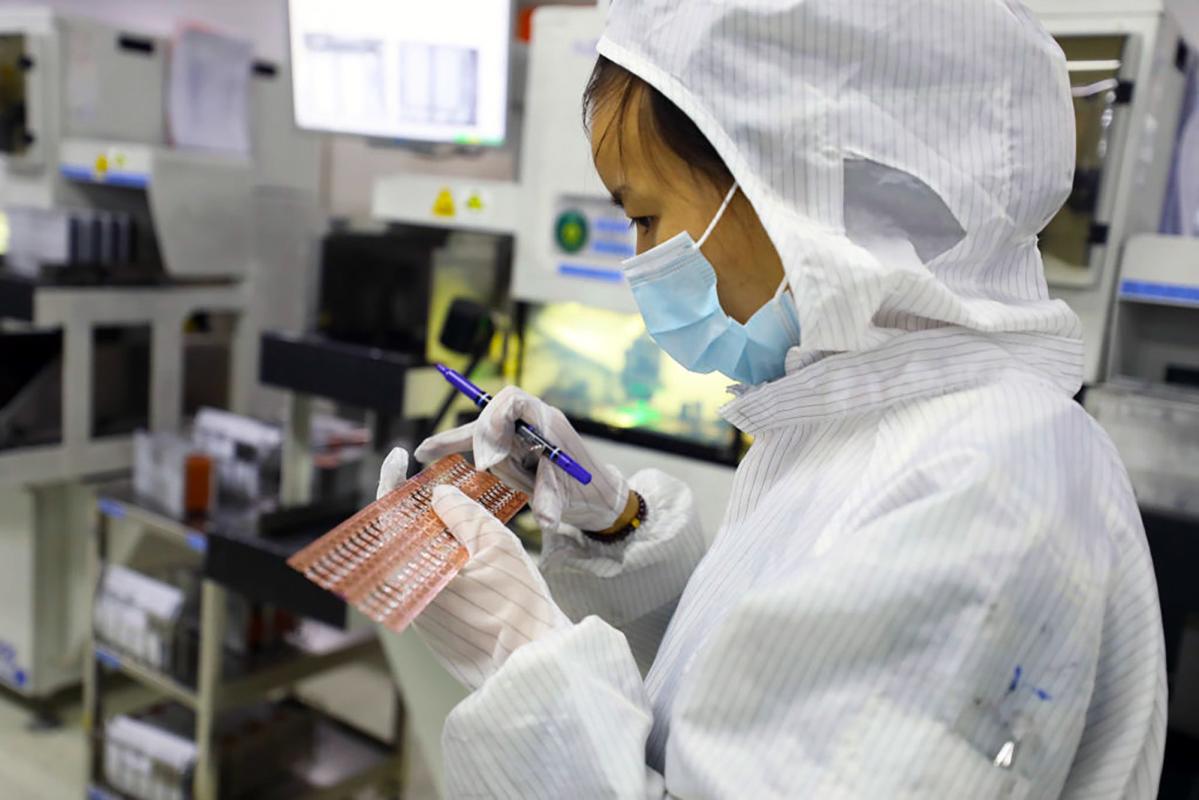(Bloomberg) -- Key members of China’s most influential scientific body have outlined the country’s plan to circumvent US chip sanctions for the first time, codifying Beijing’s view of how it could win a crucial technological conflict with Washington.
Two of the country’s senior academics wrote that Beijing should amass a portfolio of patents that govern the next generation of chipmaking, from novel materials to new techniques. That should propel its semiconductor ambitions while giving China the clout to push back against US sanctions designed to hamstring its semiconductor sector, Luo Junwei and Li Shushen wrote in the bulletin of the Chinese Academy of Sciences.
The article, published to a social media account affiliated with the academy, offers a rare glimpse into how Beijing thinks about and might react to the Biden administration’s escalating hostilities over semiconductors. The academy advises China’s top decision makers and the article echoes remarks by President Xi Jinping calling for victory in developing core technologies. It comes as the country’s new technology overseer outlined his vision for moving past American sanctions, stressing the need to modernize and rectify weak links in its supply chain.
China has a plan to develop next-generation chip materials that it put in place in 2020 as a reaction to Trump-era restrictions. Yet that national strategy has yet to yield a technological edge on the world’s leading chipmakers. Washington has implemented a series of measures limiting exports of technology such as chipmaking gear and artificial intelligence processors to China, part of a broader set of technology sanctions.
Intensive research of groundbreaking materials, components and manufacturing will help China’s chip players build a portfolio of patents covering critical technology — the sort of essential equipment and techniques that the US is now wielding as a weapon against China, the scientists wrote.
“We should vigorously promote the spirit of scientists who pursue originality and resist low-level, repetitive follow-up research,” the scientists wrote. Li is a semiconductor physics expert and a vice president of the academic institute, while Luo works at its chip research arm.
The two pointed to a number of practical challenges for the chip industry, including a talent shortage and a lack of funding in fundamental research.
The US has imposed a series of sanctions on China’s tech industry, including blocks on companies perceived as national champions such as Semiconductor Manufacturing International Corp. and Huawei Technologies Co. Additional rules imposed over the past year also barred the world’s biggest contract chipmakers like Taiwan Semiconductor Manufacturing Co. from making cutting-edge silicon for Chinese designers.
Washington is also said to have secured an agreement with the Netherlands and Japan to restrict exports of some advanced chipmaking machinery to China, further limiting Chinese companies’ ability to advance technologically. Chinese officials have refrained from discussing countermeasures, even in closed-door meetings.

 www.yahoo.com
www.yahoo.com
Two of the country’s senior academics wrote that Beijing should amass a portfolio of patents that govern the next generation of chipmaking, from novel materials to new techniques. That should propel its semiconductor ambitions while giving China the clout to push back against US sanctions designed to hamstring its semiconductor sector, Luo Junwei and Li Shushen wrote in the bulletin of the Chinese Academy of Sciences.
The article, published to a social media account affiliated with the academy, offers a rare glimpse into how Beijing thinks about and might react to the Biden administration’s escalating hostilities over semiconductors. The academy advises China’s top decision makers and the article echoes remarks by President Xi Jinping calling for victory in developing core technologies. It comes as the country’s new technology overseer outlined his vision for moving past American sanctions, stressing the need to modernize and rectify weak links in its supply chain.
China has a plan to develop next-generation chip materials that it put in place in 2020 as a reaction to Trump-era restrictions. Yet that national strategy has yet to yield a technological edge on the world’s leading chipmakers. Washington has implemented a series of measures limiting exports of technology such as chipmaking gear and artificial intelligence processors to China, part of a broader set of technology sanctions.
Intensive research of groundbreaking materials, components and manufacturing will help China’s chip players build a portfolio of patents covering critical technology — the sort of essential equipment and techniques that the US is now wielding as a weapon against China, the scientists wrote.
“We should vigorously promote the spirit of scientists who pursue originality and resist low-level, repetitive follow-up research,” the scientists wrote. Li is a semiconductor physics expert and a vice president of the academic institute, while Luo works at its chip research arm.
The two pointed to a number of practical challenges for the chip industry, including a talent shortage and a lack of funding in fundamental research.
The US has imposed a series of sanctions on China’s tech industry, including blocks on companies perceived as national champions such as Semiconductor Manufacturing International Corp. and Huawei Technologies Co. Additional rules imposed over the past year also barred the world’s biggest contract chipmakers like Taiwan Semiconductor Manufacturing Co. from making cutting-edge silicon for Chinese designers.
Washington is also said to have secured an agreement with the Netherlands and Japan to restrict exports of some advanced chipmaking machinery to China, further limiting Chinese companies’ ability to advance technologically. Chinese officials have refrained from discussing countermeasures, even in closed-door meetings.

Top Chinese Scientists Sketch Out Plans to Thwart US Chip Curbs
(Bloomberg) -- Key members of China’s most influential scientific body have outlined the country’s plan to circumvent US chip sanctions for the first time, codifying Beijing’s view of how it could win a crucial technological conflict with Washington.Most Read from BloombergApple Makes Major...

